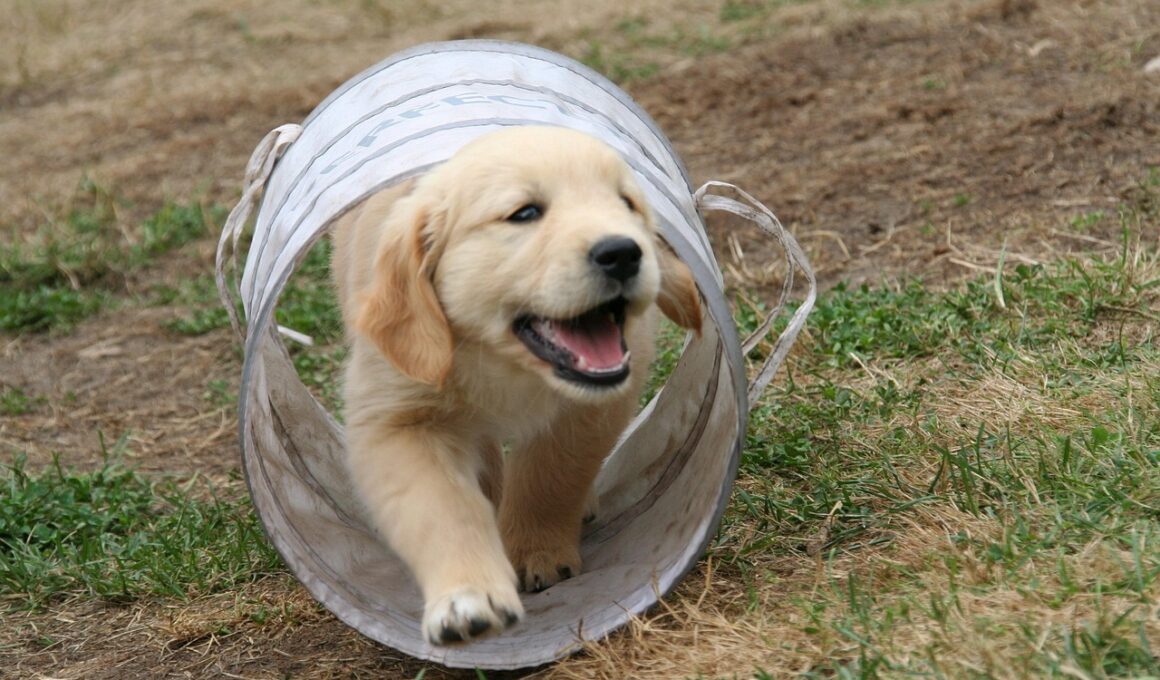Socialization Milestones: Helping Your Puppy Grow Confident
Bringing a puppy into your home is a rewarding venture, but it comes with responsibilities. Socialization is a critical phase in a puppy’s early life that shapes a well-rounded adult dog. It begins from the moment your puppy arrives, allowing them to learn about the world around them. Exposure to various people, environments, and experiences is crucial during this period. Socialization not only helps in developing confidence but also minimizes the chances of behavioral problems later. An essential element is gentle introductions to new circumstances, ensuring positive reinforcement is used effectively. Start by exposing your puppy to friendly dogs, various sounds, and different types of people. Encouraging exploration allows them to develop coping skills for future challenges. Remember, consistent and positive interactions are essential as your puppy grows. It’s beneficial to attend puppy classes to provide structured learning alongside social interaction. Implementing these strategies creates a confident and adaptable dog, paving the way for a bond that lasts a lifetime. Investing time now reaps rewards, ensuring your puppy grows into a well-socialized adult companion.
During the critical socialization window, which is typically between three to twelve weeks of age, puppies benefit immensely from exposure to various sights, sounds, and smells. This time is optimal for positive learning experiences, laying the foundation for their adult behavior. One effective approach includes scheduling playdates with other vaccinated dogs. These interactions boost confidence as puppies learn important social cues. Furthermore, taking your puppy to different environments can help familiarize them with various noises and activities. For example, walking in a busy park or visiting pet-friendly stores can be eye-opening experiences. Each encounter should be positive, emphasizing the importance of praise and treats when they respond well. Such incentives can transform potential fears into enjoyable explorations. Another helpful technique is to bring your puppy around different age groups of children, ensuring all interactions are calm and supervised. This exposure teaches them to be comfortable with kids, making future encounters less intimidating. The objective throughout this socialization process is to instill a sense of security within your puppy, building resilience that extends into adulthood. This confidence is vital for a happy, balanced pet.
Positive Reinforcement During Socialization
Positive reinforcement is a key strategy for encouraging good behavior during socialization. By using treats and praise, you can motivate your puppy to engage with their environment positively. Treats serve as tangible rewards reinforcing their courage when navigating new experiences. For instance, if your puppy approaches a new dog or explores an unfamiliar object, offer a treat and enthusiastic praise. This technique fosters a sense of achievement in your puppy, making them eager for more experiences. Avoid overwhelming situations that could lead to stress or fear. Gradually introducing new elements will help your puppy remain calm and focused. It’s also crucial to recognize signs of stress, such as avoidance or excessive barking, and to provide calm reassurance while removing them from uncomfortable situations. Additionally, focus on regularly increasing the complexity of the environments you expose them to as they become more confident. Ensure each experience is associated with fun to maintain their eagerness for exploration. Ultimately, the objective is to create a positive link between their actions and rewards, turning socialization into an enjoyable part of their routine.
Group classes are a fantastic way to facilitate deep socialization among puppies. These settings provide the structure necessary to help them learn proper behavior while interacting with other dogs and people. Ideal classes focus on play but also incorporate basic commands and manners. A professional trainer can help guide proper interaction strategies, ensuring that experiences are both safe and rewarding. Puppies benefit from watching and imitating one another, so group settings are advantageous. Classes encourage dogs of different backgrounds to learn from each other, promoting experiences that a single puppy cannot achieve. Engaging in activities under supervision helps teach manners in a controlled environment, reinforcing lessons learned. Furthermore, ensuring the safety and health of all participating dogs is essential. Puppy classes provide a broken-in environment where they can learn to communicate effectively. It’s great for developing lifelong skills while simultaneously supporting your puppy’s confidence in future interactions. Regular attendance to these classes results in gradual improvements in your puppy’s behavior, preparing them for diverse encounters throughout their lives. This foundational training builds a reliable framework for their development, crucial for any responsible dog owner.
Exposing Puppies to Different Environments
As your puppy grows, various environments become critical to their development. Exposing them to these places can help prevent fear and anxiety later in life. Start with quieter areas, gradually moving on to busier environments as your puppy becomes more comfortable. Parks, public transport, and shopping centers are excellent places to expose your puppy to urban life. The smiles and interactions your puppy receives can reinforce positive memories associated with environments outside the home. Be aware of your puppy’s limits; if they show signs of anxiety, scale back and make the experience easier. Set short visits that can be expanded as their confidence grows. Another effective way is to change your walking route regularly, encouraging them to encounter different people, animals, and sights. Each walk can become a mini adventure, allowing your puppy to learn and adapt. Ideally, each experience should end on a high note, ensuring they leave with positive associations. Always have treats on hand to reward calm behavior, reinforcing the benefits of exploring new settings. Remember that socialization is an ongoing process that requires attention and care throughout their lives.
Socialization does not solely involve interactions with humans and other animals. Positive experiences with different objects, surfaces, and sounds significantly influence your puppy’s development. Introduce your puppy to various surfaces like grass, concrete, and gravel, allowing them to adapt to different textures. Playing with toys that produce sounds or move in unexpected ways can further help them associate these stimuli with fun. For example, squeaky toys or balls can create an enjoyable distraction. It’s also helpful to expose your puppy to household sounds such as vacuum cleaners, kitchen appliances, or doorbells. Begin at a distance, gradually decreasing as your puppy shows comfort. Socialization is about creating brilliant memories, and each encounter should be enjoyable. If certain stimuli provoke fear, counter it with patience and assurance rather than force. Let your puppy explore at their own pace while providing guidance as needed. Aim for a balance between exploration and comfort, ensuring security during each engagement. This careful approach will promote a well-adjusted and robust personality. A confident puppy will grow into an adult dog ready to face the world without fear, which is your ultimate goal.
Consistency in Socialization Efforts
Consistency is key to effective puppy socialization. Establishing a routine encourages puppies to thrive in their environment. Develop a socialization schedule that incorporates various activities each week. This schedule can include outings, training classes, and playdates. Make socialization a part of their daily life to ensure they get ample exposure throughout crucial growing phases. Additionally, always strive for variety within this routine. Change locations, meeting different animals and people to keep each experience fresh and engaging. As puppies learn to embrace variety, they develop adaptability. It’s essential to remain patient throughout this process, as each puppy has their own pace. Celebrate small victories and acknowledge progress, recognizing their efforts along the way. Consider enlisting friends and family to help expose your puppy to new experiences. A diverse group of people allows them to witness different behaviors and attitudes. Encourage visitors to offer treats and engage during visits, reinforcing positive socialization. Always prioritize safety during interactions with unfamiliar dogs, ensuring both parties are comfortable. By maintaining consistent engagement throughout their early life, you can foster a confident and well-rounded canine companion.
Ultimately, the success of socialization lies in the owner’s commitment to the process. Recognizing the importance of this phase is the first step in raising a well-adjusted puppy. Building confidence relies on the steady reinforcement of positive behaviors and healthy interactions. Owners must remain observant, noting when their puppy feels anxious or uncomfortable. Responding promptly and appropriately helps build trust between the owner and puppy, solidifying their bond. Active involvement in social experiences adds depth to your puppy’s encounters, enriching their daily life. Always prioritize safety for both the puppy and others, fostering a positive learning environment. Remember that socialization continues well past the early months of life. Every encounter in the outside world presents an opportunity for learning and growth. Your ongoing commitment to socializing your puppy sets them up for lifelong success. Dogs adept at socialization are less likely to experience behavioral issues stemming from fear or anxiety. The key is to maintain a supportive, engaging, and encouraging approach that appeals to your puppy’s curious nature. Through your guidance and dedication, your puppy can develop into a well-rounded, confident adult dog who thrives in their environment.


